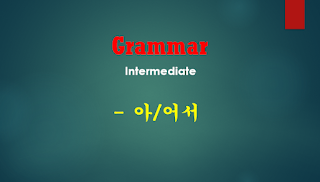V 아/어서
-아/어서 is a connective ending indicating the temporal relationship between events. Specifically, it expresses the occurrence of the action in the second clause after the action in the first clause has occurred. The two actions are so closely related that the second action cannot occur without the first action occurring first. This expression corresponds to ‘and’ or ‘(in order) to’ in English. Moreover, 서 can often be omitted from -아/어서, leaving just -아/어, but this is not possible with certain verbs, '1cluding 가다 (to go), 오다 (to come), and 서다 (to stand). It is formed by adding -아서 to stems ending in the vowel ㅏor ㅜ Otherwise, -어서 is added. For verbs ending in 하다, 해서 is added.
1. 바나나를 까서 먹었어요. 평혈 (The monkey) peeled a banana and ate it.
2. 네 시간 동안 공원에 앉아서 이야기했어요.( we) sat in a park for four hours and talked.
3.여자 친구에게 목걸이를 사(서) 주었어요. I bought a necklace for my girlfriend and gave it to her.
**In the case of sentences in the past, present, or future tense, the tense is expressed only in the second verb, not the first.
- 어제 친구를 만나서 영화를 봤어요. Yesterday, I met a friend to watch a movie.
- 내일 친구를 만나서 영화를볼거예요. Tomorrow, I will meet a friend to watch a movie
The subjects of both verbs are the same.
- 나는어제 친구 만나서 친구는영회를봤어요. (X)
Yesterday 1 met a friend and (1) watched a movie



![[Video Lesson] V- (으)ㄹ 바에는[바에야] (차라리)](https://blogger.googleusercontent.com/img/b/R29vZ2xl/AVvXsEiwkGyP7qlWFSS_w4M6KJl9Zus3mNEUFyWqirgTm_YpQhlgXkzUHGh3En5C_IUG3c2wZEGw7SKiWf5SksJ2slpjR5x12uCpM2ML_u7BkYPU4gd8MwjXpsOyF8Kiojo2qmX6ujX5n-T6CG9462zac6JTkHfHGwYh0hJNQTVvXpCAdEtl2ItTTSQn8mL9WQ/w680/%EB%B0%94%EC%97%90%EB%8A%94%5B%EB%B0%94%EC%97%90%EC%95%BC%5D%20(%EC%B0%A8%EB%9D%BC%EB%A6%AC)video.PNG)
![EPS-TOPIK Test [Listening-2]](https://blogger.googleusercontent.com/img/b/R29vZ2xl/AVvXsEi4eCnsMh8pDQqBXrE9T_u886vg4dQs0yRYeQ6QgfsqdS0hkZ4318tzwJuoEuaR_QBSbIW-Fs_EGtGEQXjyhaUm7sgUEEOmehdyrbUdXbHCkN9m2NdxO4zY4jNwaj9uJcwdxVMGxLflcuEDrPBYxps4M-ARAAbzsFRSGdm3FKVZjaF_wrCMOdGkBM649Q/w680/eps%20topik%20test.PNG)
![커녕 [Intermediate Grammar]](https://blogger.googleusercontent.com/img/b/R29vZ2xl/AVvXsEhKckQtTreCTRfHaKeCFIS3r410JgLpD93HfuPh-YKUiIxtTIAMhb8__BtxbSsv7_6pw15v-K9MBrz_KpVmbdLKcv8AxQG318qDDEzrap7KhfEA10WYUjXCzZas7rCrmmGp0ZbMEWvAuJavEZHYRGUcw_AuHPgJ1ZscGOqhEYQhS2Rg38Mc6qyj9kCZhg/w680/%EC%BB%A4%EB%85%95.PNG)
